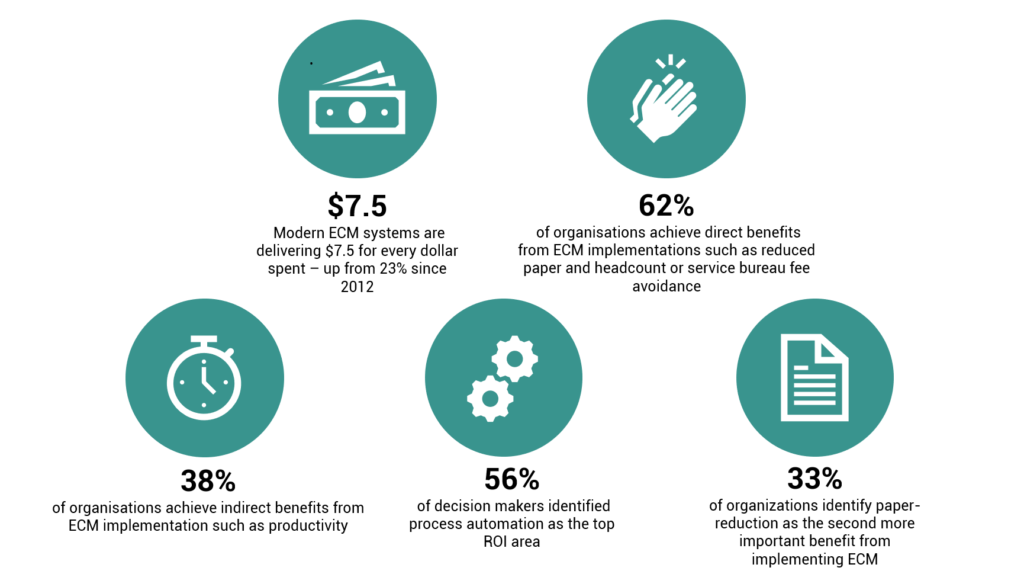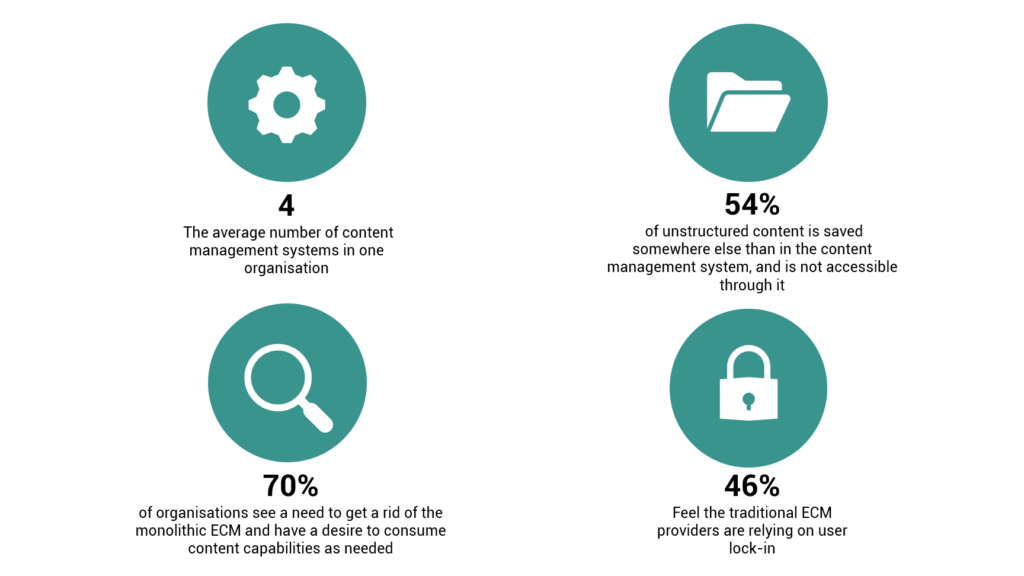In Governance, Content Management is related to numerous concepts. We could talk about this relation for hours due to the involvements with all the sectors of a same company. As such, what would a company be without content and rules to manage it…?
Let’s try to tackle a few of its numerous aspects and roughly summarise them.
Why is ECM that important for your organisation?
ECM RETURN DIVIDENDS

Nowadays, Content Management is fully integrated into Enterprise Governance due to communication means improvements, Internet expansion but also due to an increasing need in information availability.
Content Management appeals to aspects such as storage, sharing, management / maintenance / compatibility of the information, data access (which leads to security), transport, especially via networks, and its access through different medias. More and more data are digitalized but also need to be accessible all the time and from anywhere. This is where a good Governance Strategy is important.
Back to a few decades, the moto was “let’s store all our papers in labelled binders” ..then became…”let’s print everything and put the papers in binders”…which led to “ok, let’s store on local servers…” and finally the amount data has increased so much and so fast that we are at “let’s store in the Cloud !” with the management and security risks linked to it if things were not sufficiently thought in advance.
While everything was previously done on paper, communications evolution digitalized the content, but it also became more diverse. It can be a simple data (a number, references…), documents (with several formats), images, sounds, videos, data coming from other locations or applications and they all must be compatible together. Content needs to be accessed by more and more people, more and more ways, as quickly as possible and easily. In this scope, the more the amount of data, the robust the network.
“This growth in data also means more maintenance, more security, more rules and constraints[…]”
This diversity and expansion inevitably lead to increasing the storage. And thisgrowth also means more maintenance, more security, more rules and constraints hence the wish for companies to consider migrating their content to the Cloud. Almost unlimited storage for a cheap price and no more maintenance cost. The main point to care about becoming security and once again, here come again the Governance aspects since now that the content is not located inside the company anymore, new rules have to be established and agreed with the third-party services holding the data and this, in relation with security but also company’s privacy.
Considering that content represents the value of a company, there are, therefore, lots of questions surrounding it like:
- What is my content?
- What do I want to do with it?
- Who should access it and what can they do with it?
- Where to store it and how to access it?
- What security should be applied to it?
- …
These are few of the questions Governance should answer.
Governance is there to manage the different aspects of a company, establish rules, limit risks taken and establish plans in order to anticipate/mitigate problems.
When governance comes into play

The way users handle data has also substantially changed and can impact a whole company. While there was initially no need for explanations, except maybe for a classification methods, users are now facing a new level of complexity.
People need to be trained, need to be provided with guide lines in order to be able to handle the information the right way. Different rules and best practices have to be clear and easy to remember. And depending on the type of data, the location it will be stored can also be of first importance, clearly, you won’t store Christmas party pictures with your employees’ salary information.
Lots of companies give guidelines to their new comers. The problem is they receive so many information in the first few days that they just feel outstripped and they can’t remember most of the things they’ve been told. Some companies provide regular quick training sessions to keep people aware of the good practices. Problem is if the rules are not clearly defined by governance, data may be handled the wrong way and that can have a huge impact on the company. Most of the users think “I can manage my professional data. I do it with my data at home, it’s not rocket science!” but personal home data doesn’t have the same criticality as Enterprise data can have. And that’s where we fall back to the security.
So, why is Governance important for Enterprise Content Management?
There’s a big game going on around Content Management and Governance.
Content represents the value of a company. Governance committees should establish clear rules stating how to handle which type of information since content is related to everything. They need to consider as many aspects as possible in order to protect the information, providing the right level of access and security according to the people who need to use it.
From the moment those rules are set, users have the guidelines to handle it properly, efficiently and securely…but it’s still necessary to raise awareness, inform them about the rules with a clear communication such as training sessions, periodic information, easily accessible and clear documentation.
An efficient governance takes time and should be able to challenge the enterprise’s different aspects when necessary but also try to adapt to new regulations, tools and means when if needed.


